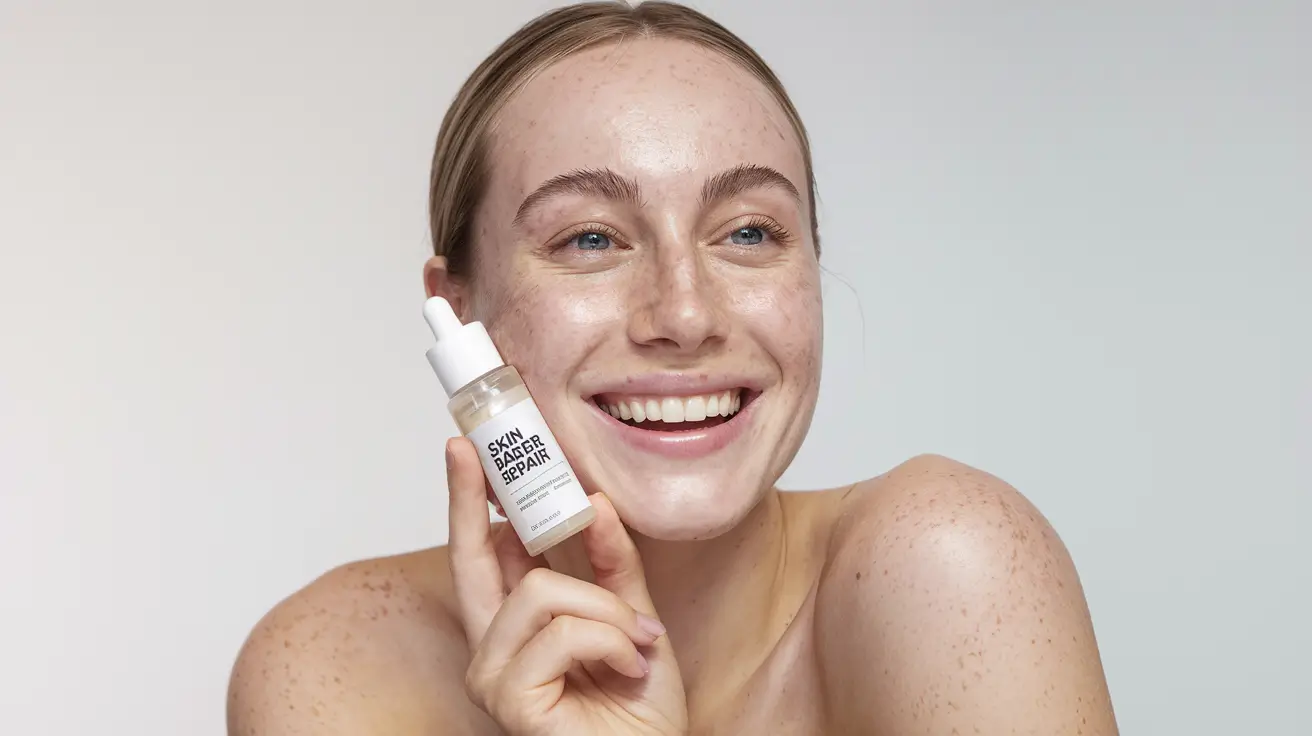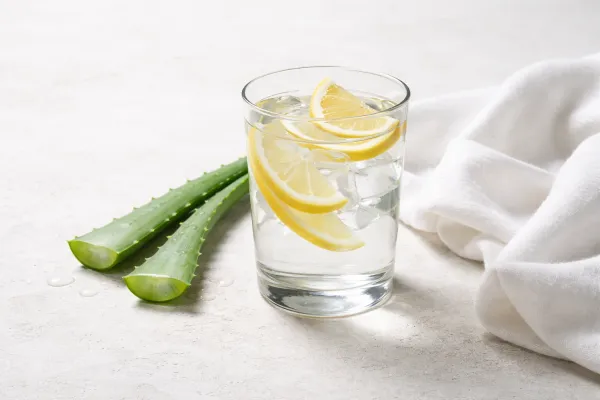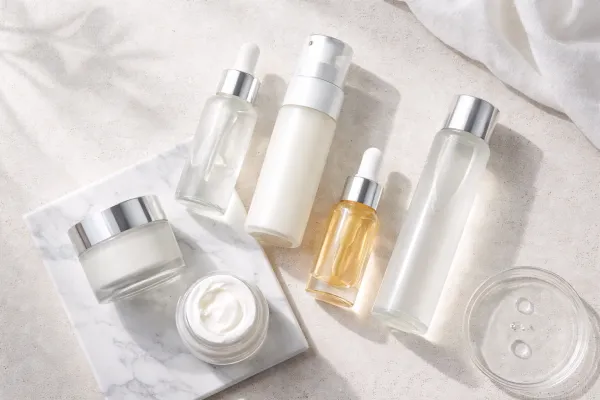Learn How to Avoid Damaging the Skin Barrier
Learn how to avoid damaging the skin barrier with our expert guide. Discover gentle skincare tips, hydration techniques, and sun protection strategies for healthy skin.

Ever wondered why your skin sometimes feels like it's throwing a tantrum? Redness, dryness, breakouts – it's like your face is staging a protest. The culprit could be a damaged skin barrier.
Think of your skin barrier as the bodyguard of your face, protecting it from all the bad stuff out there. When this bodyguard is weak, your skin suffers. But don't worry, it's not all doom and gloom.
Understanding how to avoid damaging the skin barrier is the first step to achieving healthy, happy skin. It's about being gentle, not aggressive, and listening to what your skin is actually telling you.
Key Takeaways: How to Avoid Damaging the Skin Barrier
- Use gentle, sulfate-free cleansers to avoid stripping natural oils.
- Limit exfoliation to 2-3 times a week with gentle products.
- Hydrate your skin daily with moisturizers containing ceramides and hyaluronic acid.
- Always use broad-spectrum sunscreen to protect from UV damage.
- Avoid harsh chemicals in skincare and household products.
- Use lukewarm water for washing to prevent oil stripping.
- Maintain good hygiene and hydrate from within by drinking plenty of water.
- Eat a balanced diet rich in vitamins and essential fatty acids.
- Prioritize sleep for overall skin health and barrier repair.
- Be patient and consistent with your skincare routine.
Understanding the Importance of a Gentle Cleanser
The first step in any skincare routine is cleansing, but this is where many people go wrong. Think of your cleanser like a gentle wash for your face, not a harsh scrub. Many cleansers, especially those with sulfates, are like tiny wrecking balls for your skin barrier. They strip away the natural oils that your skin needs to stay healthy and hydrated.

Instead, opt for sulfate-free and non-foaming cleansers. These are like a soft hug for your skin, cleaning without causing damage. Look for pH-balanced formulas, which help maintain the skin’s natural acidity, which is vital for a healthy barrier.
I remember when I was younger, I used to use whatever soap was in the shower, and my skin was always a mess. It wasn't until I switched to a gentle cleanser that I realized how much of a difference it made. Choosing the right cleanser is like choosing the right foundation for a building – it needs to be strong and supportive.
For more information on cleansers, check out our guide on top cleansers for teenage skin.
- Sulfate-free cleansers are less likely to cause irritation.
- Non-foaming cleansers are gentler on the skin.
- pH-balanced formulas maintain the skin's natural acidity.
- Avoid cleansers with harsh chemicals or fragrances.
- Look for cleansers with hydrating ingredients like glycerin.
Here's a quick comparison table:
| Cleanser Type | Sulfate Content | Foaming Action | pH Balance | Impact on Skin Barrier |
|---|---|---|---|---|
| Gentle Cleanser | Sulfate-free | Non-foaming | pH-balanced | Protects and maintains |
| Harsh Cleanser | Contains sulfates | Foaming | May be alkaline | Can damage and strip |
The Exfoliation Balancing Act
Exfoliation is like weeding a garden – it removes the dead stuff so the new stuff can grow. But just like over-weeding can damage your plants, over-exfoliating can damage your skin barrier.
The key is to find the right balance. Limit exfoliation to 2-3 times a week, and choose gentle exfoliating acids like lactic acid or enzyme-based exfoliants. Avoid harsh scrubs that can cause micro-tears in the skin.
I've seen so many people go overboard with scrubs, thinking they're getting cleaner, but they're actually just hurting their skin.
Think of it like this: you wouldn't scrub a delicate silk shirt with a rough brush, so why would you do that to your face? Remember, gentle is the name of the game.
For more tips on exfoliation, see our guide on exfoliation for teenage skin.
- Limit exfoliation to 2-3 times per week.
- Choose gentle exfoliating acids like lactic acid.
- Opt for enzyme-based exfoliants.
- Avoid harsh scrubs with large particles.
- Pay attention to how your skin reacts and adjust accordingly.
Here’s a breakdown of different exfoliation methods:
| Exfoliation Method | Frequency | Gentleness | Best For |
|---|---|---|---|
| Gentle Acids (Lactic, Mandelic) | 2-3 times a week | Gentle | All skin types, especially sensitive |
| Enzyme Exfoliants | 2-3 times a week | Gentle | Sensitive skin |
| Harsh Scrubs | Not recommended | Harsh | Can damage all skin types |
Hydration is the Cornerstone of a Healthy Skin Barrier
Hydration is like giving your skin a big drink of water. A well-hydrated skin barrier is a strong skin barrier. Use a daily moisturizer with ingredients like hyaluronic acid, ceramides, niacinamide, and fatty acids.
These ingredients are like the superheroes of hydration, working together to keep your skin plump and healthy. Applying moisturizer on damp skin enhances its effectiveness, as it helps to lock in the moisture.

I always tell people, think of your skin like a sponge – if it's dry, it's brittle and easily damaged. But if it's damp, it's flexible and strong.
For more information on moisturizers, check out our guide on the best moisturizers for teenage skin.
- Use a daily moisturizer with hyaluronic acid.
- Look for ceramides to support the skin's lipid layer.
- Niacinamide helps to improve skin barrier function.
- Fatty acids replenish moisture and protect the skin.
- Apply moisturizer on damp skin for better absorption.
Here are some key hydrating ingredients and their benefits:
- Hyaluronic Acid: Attracts and holds moisture in the skin.
- Ceramides: Reinforce the skin's lipid barrier.
- Niacinamide: Improves skin barrier function and reduces inflammation.
- Glycerin: A humectant that draws moisture to the skin.
- Fatty Acids: Replenish the skin's natural oils.
The Power of Moisturizing Ingredients
When it comes to moisturizers, it's not just about slapping on any cream. It's about choosing the right ingredients that will actually help your skin barrier. Ceramides, hyaluronic acid, glycerin, and fatty acids are like the building blocks of a healthy skin barrier.
They work together to replenish moisture and protect your skin from environmental stressors. Ceramides are especially important because they help to repair the lipid layer, which is like the mortar holding your skin cells together.
Think of it like this: if your skin is a brick wall, ceramides are the mortar that keeps it strong and stable. I've seen firsthand how incorporating these ingredients into a routine can transform someone's skin. It's like giving your skin the tools it needs to heal itself.
For more information on the benefits of ceramides, check out our guide on ceramides for skin barrier health.
- Ceramides help repair the skin's lipid layer.
- Hyaluronic acid provides intense hydration.
- Glycerin draws moisture to the skin.
- Fatty acids replenish the skin's natural oils.
- These ingredients work together to protect and hydrate.
Here’s a quick table highlighting the benefits of these ingredients:
| Ingredient | Benefit |
|---|---|
| Ceramides | Repairs and strengthens the lipid barrier |
| Hyaluronic Acid | Provides intense hydration |
| Glycerin | Attracts and retains moisture |
| Fatty Acids | Replenishes skin's natural oils |
Sun Protection: Your Skin Barrier's Best Friend
UV radiation is like a silent enemy that can wreak havoc on your skin barrier. It's one of the most common causes of skin barrier damage. Applying a broad-spectrum sunscreen with an SPF of 30 or higher is like putting on a shield for your skin.
Make it a daily habit, even on cloudy days. And don't just rely on sunscreen – wearing protective clothing like long sleeves, pants, and a wide-brimmed hat can provide extra protection.
I always tell people, sunscreen isn't just for the beach; it's for everyday life. It's like wearing a seatbelt in a car – it's a simple step that can save you from a lot of trouble down the road.
For more information on sunscreens, see our guide on the best sunscreens for teens.
- Apply broad-spectrum sunscreen with SPF 30 or higher daily.
- Sunscreen protects against UV radiation.
- Wear protective clothing like long sleeves and hats.
- Reapply sunscreen every two hours, especially after swimming or sweating.
- Don't forget to protect your lips with a lip balm that has SPF.
Here's a quick guide on sun protection:
- Broad-spectrum sunscreen protects against both UVA and UVB rays.
- SPF 30 blocks about 97% of UVB rays.
- Reapply sunscreen every two hours, or more frequently if swimming or sweating.
- Wear protective clothing, like hats and sunglasses.
- Seek shade during peak sun hours.
The Role of Occlusive Moisturizers
Occlusive moisturizers are like the final layer of protection for your skin. They form a barrier on the skin, sealing in moisture and supporting the healing process of the skin barrier.
Ingredients like petrolatum and shea butter are excellent occlusive agents. Think of them like a raincoat for your skin, preventing water loss and keeping your skin hydrated.
I often recommend occlusives to people who have severely damaged skin barriers, because they provide that extra layer of protection that the skin needs to heal. It's like putting a bandage on a wound – it helps to keep the area protected so it can heal properly.
For more information on skin barrier repair, see our guide on best ingredients for skin barrier repair.
- Occlusive agents form a protective layer on the skin.
- Petrolatum is a highly effective occlusive.
- Shea butter is a natural occlusive with moisturizing properties.
- Occlusives help to seal in moisture and prevent water loss.
- Use occlusives as the last step in your skincare routine.
Here's a comparison of common occlusive ingredients:
| Ingredient | Type | Benefits |
|---|---|---|
| Petrolatum | Occlusive | Highly effective at preventing water loss |
| Shea Butter | Occlusive | Natural, moisturizing, and soothing |
| Beeswax | Occlusive | Forms a protective barrier |
Avoiding Harsh Chemicals: A Must
Harsh chemicals are like tiny irritants that can damage your skin barrier over time. Many skincare products and household cleaners contain these chemicals, so it's essential to be mindful of what you're using.
Opt for gentle, non-toxic products instead. This is especially important for people with sensitive skin or those who are prone to skin issues.
I've seen so many people unknowingly damage their skin by using products with harsh chemicals. It's like using a harsh cleaning solution on a delicate fabric – it might get the job done, but it'll also damage the fabric in the process. Choosing gentle products is a simple way to protect your skin barrier.
For more information on skincare for sensitive skin, see our guide on skincare routine for sensitive skin.
- Avoid skincare products with harsh chemicals.
- Opt for gentle, non-toxic products.
- Be mindful of the ingredients in household cleaners.
- Look for products that are fragrance-free.
- Choose products with natural and soothing ingredients.
Here are some common harsh chemicals to avoid:
- Sulfates (SLS, SLES): Can strip the skin of natural oils.
- Parabens: Preservatives that can cause irritation.
- Synthetic fragrances: Can cause allergic reactions.
- Alcohol: Can dry out the skin.
- Formaldehyde: A preservative that can be irritating.
The Importance of Lukewarm Water
Hot water might feel great on your skin, but it's actually doing more harm than good. Hot water can strip the skin of its natural oils, causing further damage to the skin barrier. Use lukewarm water when washing your face or taking a shower, and avoid soaking in hot baths.
It's like washing your hands too often with hot water – it dries them out and makes them prone to cracking. The same goes for your face. I always tell people to treat their skin like a delicate flower – it needs gentle care and the right temperature.
For more information on skincare routines, see our guide on the ultimate AM and PM skincare routine.
- Use lukewarm water when washing your face.
- Avoid hot water, which can strip the skin of its natural oils.
- Take shorter showers to prevent over-drying.
- Avoid soaking in hot baths.
- Pat your skin dry instead of rubbing it.
Here’s a quick comparison of water temperatures:
- Hot Water: Strips natural oils, can damage skin barrier.
- Lukewarm Water: Gentle, cleanses without stripping oils.
- Cold Water: Can be refreshing, but may not cleanse effectively.
Lifestyle Factors: Hydration, Diet, and Sleep
Protecting your skin barrier isn't just about what you put on your skin; it's also about how you treat your body from the inside out. Drinking plenty of water is essential to maintain the health of the skin barrier.
A diet rich in vitamins, antioxidants, and essential fatty acids also supports the skin's natural barrier function. And don't forget about sleep – it's crucial for overall health, including skin health.
Aim for at least seven to eight hours of sleep per night. I always say, your skin is a reflection of your overall health. If you're not taking care of yourself, your skin will show it.
For more information on how diet affects skin, see our guide on how diet affects teenage skin.
- Drink at least eight glasses of water per day.
- Eat a healthy diet rich in vitamins and antioxidants.
- Include essential fatty acids in your diet.
- Aim for 7-8 hours of sleep per night.
- Avoid dehydrating beverages like alcohol and caffeine.
Here's a quick guide on lifestyle factors:
- Hydration: Drink plenty of water and eat hydrating foods.
- Diet: Focus on fruits, vegetables, and healthy fats.
- Sleep: Aim for 7-8 hours of quality sleep per night.
- Stress Management: Practice relaxation techniques.
Patience and Consistency: The Key to Success
Restoring the skin barrier takes time and consistency. Avoid the urge to over-treat your skin or start multiple new products at once. Give your skin at least 2-4 weeks to noticeably settle down with a gentle, nourishing routine. It's like training for a marathon – you can't expect to see results overnight.
You need to be patient, consistent, and listen to your body. I've seen so many people get frustrated and give up when they don't see immediate results, but the key is to stick with it. Your skin will thank you in the long run.
For more information on restoring the skin barrier, see our guide on restore your skin barrier.
- Be patient and consistent with your skincare routine.
- Avoid the urge to over-treat your skin.
- Give your skin at least 2-4 weeks to adjust to a new routine.
- Introduce new products slowly, one at a time.
- Listen to your skin and adjust your routine as needed.
Here's a reminder of the key steps to take:
- Use gentle cleansers.
- Avoid over-exfoliation.
- Hydrate your skin daily.
- Prioritize sun protection.
- Avoid harsh chemicals.
- Use lukewarm water.
- Maintain good hygiene.
- Hydrate from within.
- Eat a healthy diet.
- Get enough sleep.
Conclusion
Protecting your skin barrier is like building a strong foundation for your skin. It's not about quick fixes or harsh treatments; it's about being gentle, consistent, and listening to what your skin needs.
By using gentle cleansers, avoiding over-exfoliation, hydrating your skin, prioritizing sun protection, and making healthy lifestyle choices, you can ensure that your skin barrier remains strong and resilient.
Remember, patience is key, and the results will be worth the effort. Your skin is your body's largest organ, and it deserves the best care possible. Now, go out there and give your skin the love it deserves!

Frequently Asked Questions: Understanding Your Skin Barrier
1. What is the skin barrier, and why is it so important?
The skin barrier, also known as the stratum corneum, is the outermost layer of your skin that serves as a protective barrier. It keeps moisture in and harmful irritants, bacteria, and allergens out. A well-functioning skin barrier is crucial for healthy skin, helping it defend against external stressors like pollution and UV rays.
2. What are the symptoms of a compromised or weak skin barrier?
When your skin barrier is compromised, you may experience:
- Dryness and flakiness.
- Sensitivity to products or environmental factors.
- Increased redness or irritation.
- More frequent breakouts or infections.
These are clear signs that your protective barrier becomes less effective, leaving your skin vulnerable to damage and unpleasant conditions.
3. What causes a broken or damaged skin barrier?
Common causes of skin barrier damage include:
- Over-exfoliation or using harsh cleansers.
- Sun damage or extreme weather.
- Allergens and irritants from products.
- Certain medical conditions like atopic dermatitis.
These factors weaken the barrier, making the skin prone to sensitivity, infections, and dehydration.
4. How can I repair a broken skin barrier?
To repair a compromised skin barrier:
- Use products with ceramides and fatty acids to rebuild the barrier.
- Apply a hydrating moisturizer to lock in moisture.
- Avoid over-exfoliating to prevent further skin damage.
- Stick to a simple, gentle routine until your barrier heals.
Your skin barrier is like a shield—treat it with care.
5. What are some unpleasant skin conditions caused by a weak barrier?
A compromised barrier can lead to:
- Persistent dry skin and dehydration.
- Increased skin sensitivity to products or weather.
- Skin infections, including fungal and bacterial types.
- Flare-ups of conditions like dermatitis or acne.
When your protective barrier becomes weak, your skin is vulnerable to a host of problems.
6. How does a well-functioning skin barrier defend the skin?
A healthy skin barrier defends your body by:
- Blocking harmful bacteria and pollutants.
- Preventing moisture loss to keep your skin hydrated.
- Reducing the risk of skin infections.
Think of it as your skin's personal bodyguard, always on duty.
7. Can all skin types experience barrier issues?
Yes, all skin types, from oily to dry, can suffer from barrier damage. For example:
- Oily skin might overcompensate, leading to clogged pores.
- Dry skin might become flaky and prone to skin problems like irritation.
- Sensitive skin can react to products it previously tolerated well.
Everyone benefits from maintaining a strong skin barrier.
8. What role does dermatology play in managing skin barrier issues?
Dermatologists are essential for diagnosing and treating conditions related to a compromised skin barrier. They can:
- Recommend targeted treatments for skin sensitivity or atopic dermatitis.
- Help with recurring skin infections or persistent skin damage.
- Provide advice on creating a barrier-friendly routine.
Consulting a dermatologist ensures you're not just guessing about your skin's needs.
9. How do I prevent skin damage and protect my barrier?
To keep your barrier intact:
- Avoid harsh cleansers and over-exfoliation.
- Use sunscreen daily to prevent UV-related skin damage.
- Moisturize regularly with products designed for your skin type.
Remember, prevention is easier than repair.
10. What's the connection between skin tone and barrier health?
Darker skin tones are more prone to hyperpigmentation when the barrier is damaged, while lighter tones may show redness and inflammation more visibly. Regardless of your skin tone, maintaining a well-functioning skin barrier is key to avoiding skin problems like scarring and sensitivity.
11. How does the skin barrier affect aging?
As we age, the skin barrier weakens naturally, leading to:
- Increased skin sensitivity and dryness.
- Greater vulnerability to UV-related skin damage.
- Reduced ability to retain moisture.
Incorporating barrier-strengthening products can slow the visible effects of skin aging.
12. Can using the wrong towel damage my skin?
Yes, using a rough or dirty towel can harm your protective barrier by causing micro-tears or introducing bacteria. Always:
- Use a clean, soft towel.
- Pat your skin dry—don't rub.
It's a small step with a big impact on keeping your skin barrier healthy.
13. What should I do if my skin feels sensitive and vulnerable?
Sensitive skin is often a sign of a weak skin barrier. Focus on soothing, hydrating care:
- Switch to fragrance-free, non-irritating products.
- Apply a thick moisturizer with occlusive ingredients to lock in hydration.
- Avoid overdoing active ingredients like retinol or acids until sensitivity improves.
A strong barrier equals resilient, healthy skin.
14. Can I heal my skin barrier on my own, or do I need a dermatologist?
For mild cases, you can repair a compromised barrier with gentle products and good habits. However, if you experience:
- Persistent skin sensitivity.
- Repeated skin infections.
- Chronic conditions like dermatitis.
...it's time to see a dermatologist. They can tailor treatments to your skin's needs.
15. Is it true that a strong skin barrier reduces unpleasant skin conditions?
Absolutely. A well-functioning skin barrier is your first defense against dryness, irritation, and skin problems like acne or fungal skin infections. Think of it as the foundation of good skin care—when it's strong, everything else falls into place.
16. How do I rebuild my skin barrier after over-exfoliation?
Take a break from exfoliants and focus on replenishment:
- Use a gentle cleanser.
- Apply products with ceramides, hyaluronic acid, or fatty acids to hydrate.
- Protect your skin with sunscreen daily.
Your skin needs rest and care to bounce back.





